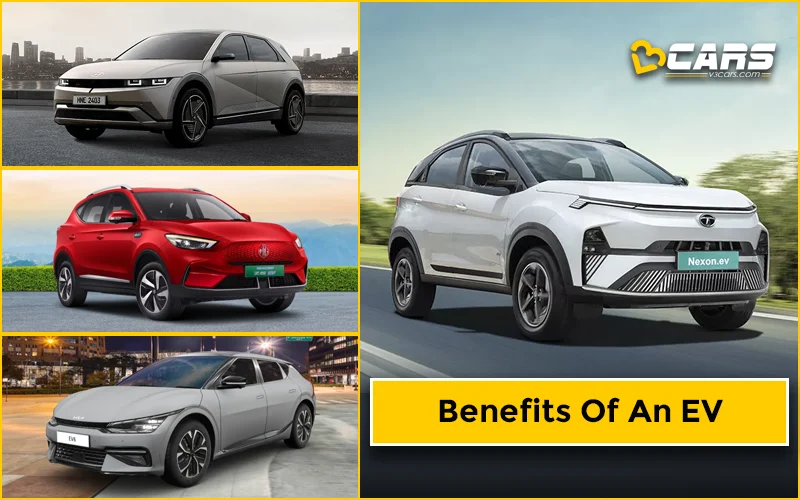What Are The Benefits Of An Electric Vehicle Or EV? V3Cars Guide
Electric vehicles (EVs) are rapidly changing the automotive landscape globally, and India is no exception. With a growing focus on sustainability and energy independence, EVs are emerging as a compelling alternative to conventional fuel-based vehicles. But are they truly ready to take centre stage on Indian roads? Let's explore the benefits and downsides of EVs in the Indian context.

Why Go Electric in India?
India grapples with several challenges that EVs can potentially address:
- Pollution Reduction: Transportation is a major contributor to air pollution in Indian cities. EVs produce zero tailpipe emissions, leading to cleaner air and improved public health.
- Lower Running Costs: EVs are significantly cheaper to run compared to petrol or diesel vehicles. Electricity costs less per kilometre than fuel, and government incentives further reduce ownership costs.
- Energy Security: India relies heavily on imported fossil fuels. EVs powered by renewable energy sources can lessen dependence on foreign oil and promote energy security.
- Silent Operation: Electric motors are much quieter than internal combustion engines, leading to a more peaceful driving experience and reduced noise pollution in urban areas.
Additional Perks:
- Government Incentives: The Indian government offers subsidies and tax benefits to promote EV adoption, making them more affordable for buyers. We will cover more on this later.
- Low Maintenance Costs: EVs have fewer moving parts compared to petrol/diesel vehicles, resulting in lower maintenance requirements.
Note: Now Find Out The Fuel Price In India Using V3Cars
Challenges To Consider Before Buying An EV
While promising, EVs in India face some hurdles:
- Limited Charging Infrastructure: Currently, India has a limited network of charging stations, which can cause range anxiety for potential EV owners.
- Higher Upfront Cost: EVs generally have a higher initial purchase price compared to petrol/diesel cars, although government incentives help bridge the gap.
- Battery Disposal Concerns: The disposal of used EV batteries needs proper infrastructure to ensure they are recycled or disposed of responsibly.
- Range Limitations: While improving, EVs generally have a shorter range compared to petrol/diesel vehicles on a single charge.
So, Should You Go Electric?
The decision to switch to an EV depends on your individual needs and driving habits. If you primarily drive short distances within city limits and have access to charging facilities, an EV can be a great choice. However, if you frequently make long journeys and require maximum range flexibility, a petrol/diesel car might be more suitable for now.
The Indian EV market is evolving rapidly, with advancements in battery technology, charging infrastructure development, and government initiatives expected to address some of the current challenges. As these improvements unfold, EVs are likely to become a more mainstream and attractive option for car buyers in India.
Note: Instantly Sell Your Old Car With V3Cars Sell Used Car Platform
Also Read: Hill Start Assist Or Hill Hold Control – Feature Explained


0 Comments
MG Cars in India
Hector
₹11.99 - ₹18.99 lakh*
*Ex-showroom priceHector Plus
₹17.29 - ₹19.49 lakh*
*Ex-showroom priceCyberster
₹75.00 lakh*
*Ex-showroom priceM9
₹69.90 lakh*
*Ex-showroom priceWindsor EV
₹14.00 - ₹18.39 lakh*
*Ex-showroom priceComet EV
₹7.50 - ₹10.00 lakh*
*Ex-showroom priceHector
₹14.00 - ₹20.76 lakh*
*Ex-showroom priceHector Plus
₹16.05 - ₹21.34 lakh*
*Ex-showroom priceHector Copy
-
*Ex-showroom priceGloster
₹38.33 - ₹43.17 lakh*
*Ex-showroom priceZS EV
₹17.99 - ₹20.50 lakh*
*Ex-showroom priceAstor
₹9.65 - ₹15.16 lakh*
*Ex-showroom priceUpcoming MG Cars
Majestor
₹39.90 - ₹45.00 lakh*
*Expected PriceExpected Launch Feb 2026
Astor Facelift
₹10.82 - ₹18.73 lakh*
*Expected PriceExpected Launch Jun 2026
eMG6
-
*Expected PriceExpected Launch Jan 2027
Marvel R
-
*Expected PriceExpected Launch Apr 2027
Euniq 7
-
*Expected PriceExpected Launch Jun 2028
MG4
-
*Expected PriceExpected Launch Oct 2028
MG5
-
*Expected PriceExpected Launch Oct 2028
HS Plug-in
Hybrid
-
*Expected PriceExpected Launch Dec 2028
Marvel X
-
*Expected PriceExpected Launch Feb 2029
G10
-
*Expected PriceExpected Launch May 2029
S5
-
*Expected PriceExpected Launch Oct 2029
RC6
-
*Expected PriceExpected Launch Dec 2029
iML6
-
*Expected PriceExpected Launch Jan 2030
7 Trophy
-
*Expected PriceExpected Launch Jan 2030
3
-
*Expected PriceExpected Launch Jun 2030
IM 5
-
*Expected PriceExpected Launch Jul 2030
IM 6
-
*Expected PriceExpected Launch Oct 2030
Latest MG Cars Videos
MG Astor Turbo Fuel Efficiency Test | Real-World Mileage Compared With MG Hector
MG Windsor EV vs Tata Curvv EV Sub Rs. 19 Lakh Battle | Which Car Is More Value For Money?
All 2025 MG Windsor EV (& Pro) Variants Explained (Excite, Exclusive, Essence) — Which One To Buy?
MG Windsor Pros And Cons Wala Review (Essence Pro: Rs. 18.10 Lakh)
MG Windsor EV Rear Seat & Boot Space Review | Can 3 People Sit In Rear Of Windsor EV?
Hyundai Creta S(O) vs MG Hector Style | Which Car Is More Value For Money?
2024 MG Windsor EV Variants Explained (Excite, Exclusive, Essence) — Which One To Buy?
MG Windsor First Drive Review | This Spacious City EV Is A Mixed Bag
MG Windsor EV Walkaround Review | Rs 10 lakh Price Explained | Interior Space, Battery Warranty
MG Astor Select vs Maruti Suzuki Brezza ZXI+ | Which Car Is More Value For Money?
Comet EV Important Links